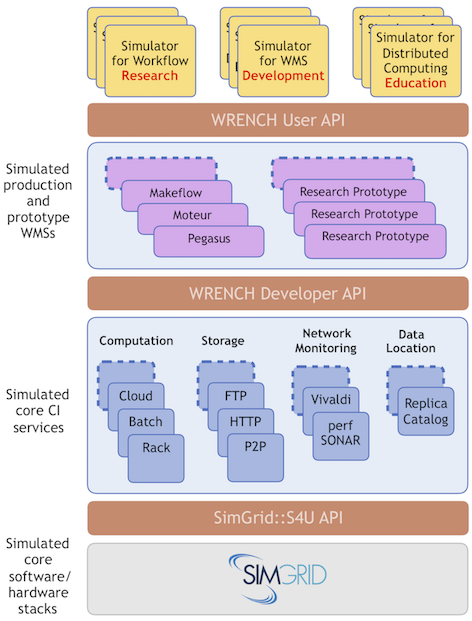 |
WRENCH
1.10
Cyberinfrastructure Simulation Workbench
|
Overview | Installation | Getting Started | WRENCH 101 | WRENCH 102 |
 |
WRENCH
1.10
Cyberinfrastructure Simulation Workbench
|
Overview | Installation | Getting Started | WRENCH 101 | WRENCH 102 |
WRENCH enables novel avenues for scientific workflow use, research, development, and education. WRENCH capitalizes on recent and critical advances in the state of the art of distributed platform/application simulation. WRENCH builds on top of the open-source SimGrid simulation framework. SimGrid enables the simulation of large-scale distributed applications in a way that is accurate (via validated simulation models), scalable (low ratio of simulation time to simulated time, ability to run large simulations on a single computer with low compute, memory, and energy footprints), and expressive (ability to simulate arbitrary platform, application, and execution scenarios). WRENCH provides directly usable high-level simulation abstractions using SimGrid as a foundation.
In a nutshell, WRENCH makes it possible to:
WRENCH is an open-source library for developing simulators. It is neither a graphical interface nor a stand-alone simulator. WRENCH exposes several high-level simulation abstractions to provide high-level building blocks for developing custom simulators.
WRENCH comprises four distinct layers:

WRENCH is intended for three different classes of users:
The WRENCH library provides three incremental levels of documentation, each targeting an API level:
User: This level targets users who want to use WRENCH for simulating the execution of scientific workflows in different simulation scenarios, using existing simulated WMSs already implemented using WRENCH. Users are NOT expected to develop new simulation abstractions or algorithms. Instead, they only use available simulation components as high-level building blocks to quickly build simulators. These simulators can be as simple as a single 50-line main() function.
Developer: This level targets WMS developers and WMS researchers who work on developing novel WMS designs and algorithms. In addition to documentation for all simulation components provided at the User level, the Developer documentation includes detailed documentation for interacting with simulated Core Services.
Internal: This level targets those users who want to contribute code to WRENCH. It provides, in addition to both levels above, detailed documentation for all WRENCH classes including binders to SimGrid. This is the API needed to, for instance, implement new Core Services.
The main channel to reach the WRENCH team is via the support email: support@wrench-project.org.
Bug Report / Feature Request: our preferred channel to report a bug or request a feature is via
WRENCH's Github Issues Track.